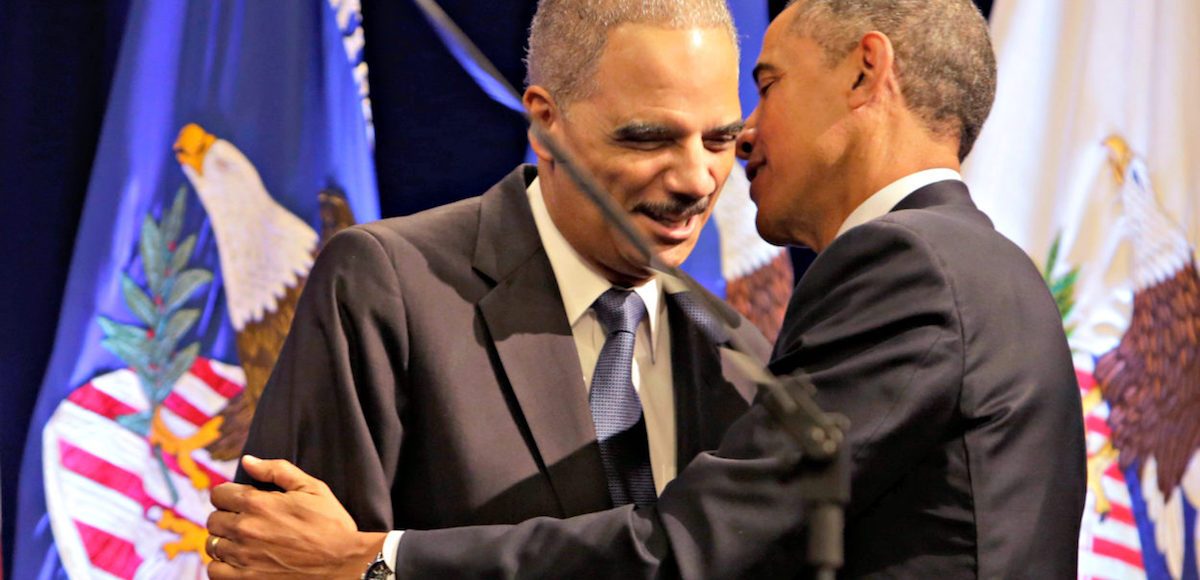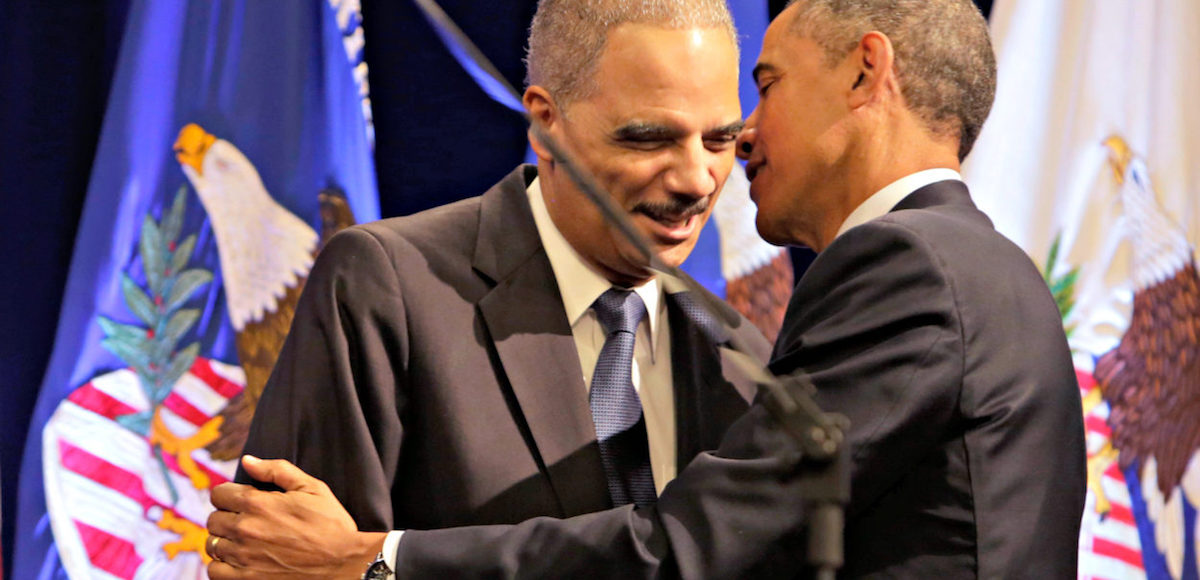

U.S. President Barack Obama greets outgoing U.S. Attorney General Eric Holder at Holder’s portrait unveiling ceremony at The Department of Justice in Washington, DC, February 27, 2015. (Photo: AP)
Donald Trump has been President for more than 200 days and those of us who want more economic liberty don’t have many reasons to be happy.
ObamaCare hasn’t been repealed, the tax code hasn’t been reformed, and wasteful spending hasn’t been cut.
The only glimmer of hope is that Trump has eased up on the regulatory burden. More should be happening, of course, but we are seeing some small steps in the right direction.
Let’s share one positive development.
Professor Tony Lima of California State University opined back in January in the Wall Street Journal that Trump could unilaterally boost growth by ending a reprehensible policy known as “Operation Choke Point.”
…the Trump administration could shut down Operation Choke Point. This program, enforced by the Federal Deposit Insurance Corp., targets “risky” banking customers and pressures banks to deny them credit. It’s unnecessary: If these industries are really risky, banks would not want their business. The real purpose of Operation Choke Point is to target industries that are out of favor…, among them: Coin dealers, money-transfer networks and payday lenders. Sales of ammunition and firearms (Second Amendment, anyone?) and fireworks (legal in some states). …Other legal goods and services such as surveillance equipment, telemarketing, tobacco and dating services. …Denying credit hampers an industry’s growth. Eliminating Operation Choke Point would encourage growth. It costs nothing. And someday it may reduce enforcement spending.
And Professor Charles Calomiris from Columbia University echoed those views a few weeks later.
Imagine you have a thriving business and one morning you get a call from your banker explaining that he can no longer service your accounts. …That’s what happened to many business owners as the result of an Obama administration policy called Operation Choke Point. In 2011 the Federal Deposit Insurance Corp. warned banks of heightened regulatory risks from doing business with certain merchants. A total of 30 undesirable merchant categories were affected…the FDIC explained that banks with such clients were putting themselves at risk of “unsatisfactory Community Reinvestment Act ratings, compliance rating downgrades, restitution to consumers, and the pursuit of civil money penalties.” Other FDIC regulatory guidelines pointed to difficulties banks with high “reputation risk” could have receiving approval for acquisitions.
Keep in mind, by the way, that Congress didn’t pass a law mandating discrimination against and harassment of these merchants. The Washington bureaucracy, along with ideologues in the Obama Administration, simply decided to impose an onerous new policy.
In effect, the paper pushers were telling financial institutions “nice business, shame if anything happened to it.” But at least when mobsters engage in that kind of a shakedown, there’s no illusion about what’s happening.
Professor Calomiris explained that this regulatory initiative of the Obama Administration made no sense economically.
It is rather comical that regulators would use the excuse of regulatory risk management to punish banks. Banks are in the business of gauging risk and have every incentive to avoid customer relationships that could hurt their reputation. Regulators, on the other hand, have shown themselves unwilling or unable to acknowledge risk, the most obvious example being the subprime mortgage crisis in 2008.
And he also explained why Operation Choke Point was such a reprehensible violation of the rule of law.
The FDIC’s regulators never engaged in formal rule-making or announced penalties for banks serving undesirable clients. Such rule-making likely would have been defeated in congressional debate or under the Administrative Procedures Act. Instead, regulators chose to rely on informal decrees called “guidance.” …Financial regulators find regulatory guidance particularly expedient because it spares them the burden of soliciting comments, holding hearings, defining violations, setting forth procedures for ascertaining violations, and defining penalties for ignoring the guidance. Regulators prefer this veil of secrecy because it maximizes their discretionary power and places the unpredictable and discriminatory costs on banks and their customers.
Well, we have some good news.
The Trump Administration has just reversed this terrible Obama policy. Politico has some of the details.
The Justice Department has committed to ending a controversial Obama-era program that discourages banks from doing business with a range of companies, from payday lenders to gun retailers. The move hands a big victory to Republican lawmakers who charged that the initiative — dubbed “Operation Choke Point” — was hurting legitimate businesses. …House Judiciary Chairman Bob Goodlatte…and House Financial Services Chairman Jeb Hensarling (R-Texas), along with Reps. Tom Marino (R-Pa.), Blaine Luetkemeyer (R-Mo.) and Darrell Issa (R-Calif.) praised the department in a joint statement. “We applaud the Trump Justice Department for decisively ending Operation Choke Point,” they said. “The Obama Administration created this ill-advised program to suffocate legitimate businesses to which it was ideologically opposed by intimidating financial institutions into denying banking services to those businesses.”
And Eric Boehm of Reason is pleased by this development.
A financial dragnet that ensnared porn stars, gun dealers, payday lenders, and other politically disfavored small businesses has been shut down. Operation Choke Point launched in 2012… It quickly morphed into a questionably constitutional attack on a wide range of entrepreneurs who found their assets frozen or their bank accounts closed because they were considered “high-risk” for fraud. …Assistant Attorney General Stephen Boyd called Operation Choke Point “a misguided initiative” and confirmed that DOJ was closing those investigations… “Law abiding businesses should not be targeted simply for operating in an industry that a particular administration might disfavor,” Boyd wrote. …The repudiation of Operation Choke Point is a welcome development, says Walter Olson, a senior fellow at the libertarian Cato Institute.
I shared a video last year that explained Operation Choke Point in just one minute. But that just scratched the surface, so here’s a video from Reason that explains in greater detail why Operation Choke Point was so repulsive.
Kudos to the Trump Administration for reversing this awful policy.
But hopefully this is just the first step. Regulators are still squeezing financial institutions in an attempt to discourage them from doing business with low-tax jurisdictions. This policy of “de-risking” exists even though so-called tax havens generally have tighter laws against dirty money than the United States.
President Trump should put an end to that misguided policy.






